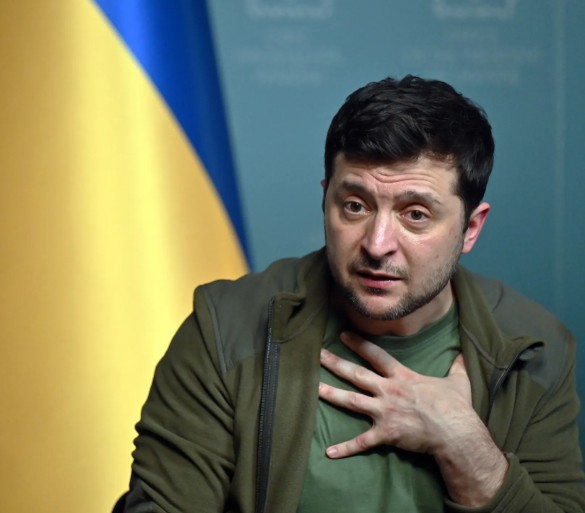Zelenskyy Offers to Hold Direct Talks with Putin, Kremlin Responds with Skepticism

In a dramatic turn in the ongoing Russia-Ukraine war, Ukrainian President Volodymyr Zelenskyy has expressed his willingness to engage in direct talks with Russian President Vladimir Putin to help bring an end to the devastating conflict. However, the Kremlin swiftly dismissed these comments, calling them “empty words” and reiterating its position that negotiations would proceed without Zelenskyy’s involvement.
In a post on social media Wednesday, Zelenskyy offered a potential path toward peace, stating that direct talks with Putin would not only be a necessary step for Ukraine but also a key opportunity for the entire civilized world to find a resolution to the ongoing war. “If the world wants peace, it is essential to have direct dialogue. Ukraine is ready for such talks,” Zelenskyy wrote, emphasizing that diplomacy is the only way forward after nearly a year of intense and brutal fighting.
The comments come amid growing international pressure for a peaceful resolution to the conflict, which has resulted in thousands of deaths and millions of displaced civilians. Zelenskyy’s call for negotiations, although a bold and calculated move, signals Ukraine’s readiness to seek an end to the bloodshed, despite the deepening rift between the two countries.
However, the Kremlin was quick to reject Zelenskyy’s statement, with Russian officials describing the proposal as nothing more than a “public relations gesture.” Dmitry Peskov, the Kremlin’s spokesperson, dismissed the idea of direct talks between the two leaders, labeling Zelenskyy’s offer as “empty words” that failed to take into account Russia’s stance on the matter.
Earlier last week, Russian President Vladimir Putin declared that Zelenskyy was “illegitimate” as a leader for potential talks, rejecting the notion of engaging directly with the Ukrainian president. Putin argued that Ukraine’s current leadership was not in a position to represent the legitimate interests of the Ukrainian people in negotiations. Instead, the Russian president indicated that he would delegate the task of communication to his trusted diplomats, dismissing any notion that a meeting with Zelenskyy could contribute to peace.
The dismissive response from the Kremlin follows a series of hardline stances from Moscow regarding the conflict, and it signals little room for compromise on their end. For Putin, the war is framed as a battle to safeguard Russian interests in Ukraine, and any attempt to end the fighting without securing his demands seems unlikely. Russia’s unwavering position regarding the legitimacy of Zelenskyy’s leadership adds another layer of complexity to the already strained diplomatic landscape.
Zelenskyy’s latest comments also come on the heels of growing calls from the international community for de-escalation. Western powers, including the United States and European Union members, have repeatedly voiced concerns about the humanitarian toll of the war and the need for dialogue. However, the prospect of genuine peace talks remains uncertain, as both sides have entrenched their positions, with each nation accusing the other of intransigence and violations of international law.
Many observers speculate that Zelenskyy’s offer for direct negotiations is an attempt to put pressure on the international community to facilitate talks or intervene diplomatically to de-escalate the conflict. It also presents a potential opportunity for Ukraine to demonstrate its commitment to peace, even if Russia remains adamant in rejecting the offer. The fact that Zelenskyy has opened the door to dialogue could help to strengthen his image as a leader committed to ending the suffering of his people while still holding firm to Ukraine’s sovereignty.
While Zelenskyy’s words reflect a willingness to engage, they also underscore the stark divide between the two leaders and their conflicting visions for the future of Ukraine. Putin’s refusal to engage directly with Zelenskyy reflects his ongoing belief that Ukraine is under the control of a Western-backed regime, rather than a legitimate, independent state. This ongoing battle over the legitimacy of Ukraine’s government and the desire for territorial control shows no signs of abating anytime soon.
As the war enters its second year, the world watches closely for any signs of diplomatic breakthroughs. With both sides seemingly locked into their positions, the possibility of direct talks between Zelenskyy and Putin remains distant. However, the mere suggestion of dialogue from Ukraine’s side signals that both leaders, despite their public defiance, may see diplomacy as an eventual necessity, even if the road to peace remains unclear.
The international community remains hopeful that both sides can find common ground, but for now, the prospect of direct talks between Zelenskyy and Putin remains a distant and contentious issue—one that will likely continue to shape the course of the conflict for months to come.
